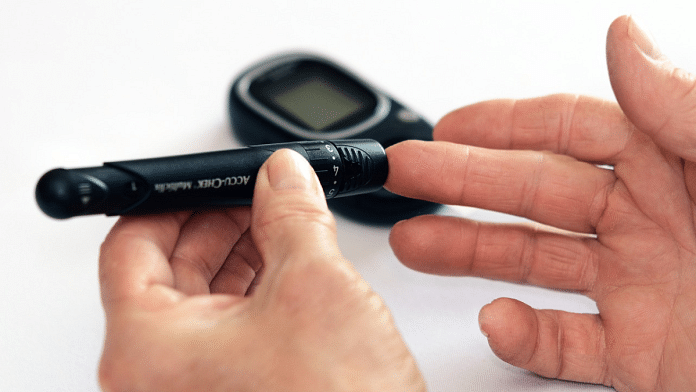New Delhi: Systemic racism, inequality, lifestyle changes and poor eating habits are accelerating the pace of diabetes in the world, a new research has revealed. In India, the study further shows, the disease is no longer limited to affluent urban areas and is now becoming increasingly common in urban slums as well as rural areas.
Published as a series in both The Lancet and The Lancet Diabetes & Endocrinology on 22 June, the study, which calls diabetes the “defining disease of the century”, was conducted by researchers from around the world, including Australia, India, South Africa, Cameroon, United States and India. Researchers belonged to various universities, among them the Albert Einstein College of Medicine-Montefiore Medical Center, USA; University of the Witwatersrand, South Africa; University of Yaoundé, Cameroon; KEM Hospital Research Centre, India; Christian Medical College, India; and Charles Darwin University, Australia.
According to the study, the number of people living with diabetes worldwide is expected to double to more than 1.3 billion in 2050 from 529 million in 2021.
In North Africa, the Middle East, Oceania and the Caribbean — which researchers believe are the most-affected regions — the disease will eventually worsen by up to 20 percent compared to other countries.
The study also shows that the disease is no longer a sign of aging as it was once perceived to be, especially in countries like India.
“Diabetes in adolescents and young people in India is on the rise, and has been shown to be associated with earlier need for insulin therapy and development of retinopathy, which is alarming given the vast number of individuals at risk in the South Asian region,” researchers wrote.
According to the papers, lifestyle changes due to the rapid economic development combined with stress is one of the contributors to such a high incidence of diabetes. In addition, endocrine disruptors — that is, chemicals, whether natural or man-made that could affect a person’s hormones — could potentially make things worse, even increasing the risk of obesity and cancer.
The study comes days after a ground-breaking assessment of the burden of non-communicable diseases (NCD) across India found that the national prevalence of diabetes is 11.4 per cent, while 35.5 per cent of Indians suffer from hypertension.
That study, conducted by the Madras Diabetes Research Foundation in collaboration with the Indian Council of Medical Research (ICMR) and the Union health ministry, showed that the state-wise prevalence of diabetes ranged from 4.8 percent in Uttar Pradesh to 26.4 percent in Goa while pre-diabetes ranged from 31.3 percent in Sikkim to 6.8 percent in Meghalaya.
The results were based on a survey of 1,13,043 people between 2008 and 2020.
How marginalisation affects incidence
The latest study published in The Lancet suggests that India has greater incidence of diabetes that Europe, primarily because “Indian people have lower muscle mass, smaller visceral organs, and a higher fat mass for a given weight than European individuals”.
“The combination of these factors can result in diabetes characterised by low insulin secretion, but higher insulin resistance than that observed in European individuals with diabetes and a similar BMI,” the study said.
But it’s not only in India where diabetes is a major cause for concern — South Asia, which also includes Bangladesh, Bhutan, India, Maldives, Nepal, Pakistan, Sri Lanka and sometimes Afghanistan, currently has the highest absolute numbers of people with Type 2 diabetes and gestational diabetes in the world, according to researchers. These numbers are expected to grow over the next 30 years.
As of 2021, the prevalence of gestational diabetes is roughly 13-26 percent globally, according to the study.
Type 2 diabetes is a long-term medical condition in which the body is unable to fully utilise insulin. Gestational diabetes is a state of high-blood sugar and insufficient insulin during pregnancy, which can affect both the mother and the child.
The study said that by 2045, three in four adults with diabetes will be living in low- and middle-income countries. This could adversely affect global mortality rates, “given that less than 10 percent of people with diabetes living in these countries receive proper attention to their condition”, researchers said.
Lack of access to high-quality healthcare and medicines, economic development, and socio-cultural norms have a significant impact on the incidence of the disease, according to the study — even in higher income countries, it’s the “marginalised and minoritised populations” that have a greater incidence of the disease than their white counterparts.
In countries such as the US, for instance, the rate of diabetes is almost 1.5 times higher among minority ethnic groups such as Native Americans, Alaska Natives, Black people, Hispanics, and Asians, compared to white populations, according to the study.
(Edited by Uttara Ramaswamy)
Also Read: Artificial sweeteners don’t aid weight loss, may increase diabetes, heart disease risk, says WHO



